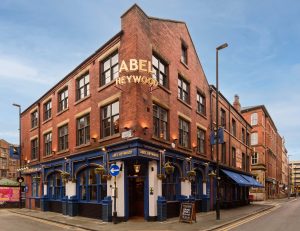Heaven knows I’m miserable now – city marred by poor health and unhappiness

GREATER Manchester’s potential is being held back, with a population that is less healthy and happy than the average person in the UK, according to a new report.
While Greater Manchester demonstrates strong levels of economic prosperity, sustainability and a sense of community, its health score in the new Vibrant Economy Index is significantly below the national average.
Analysing a range of different factors – from life expectancy and diabetes rates, to anxiety levels and sports participation – the index revealed that Manchester scored 96.93, compared to the national average of 100.
The index, which ranks 324 local authorities according to ‘vibrancy’, found that Trafford came 58th in the list of 324 local authorities. However, its neighbour Salford is 251st and Oldham in 285th place, with poor health outcomes affecting their overall performance.
The index also reveals disparities in the levels of healthy and happy across Greater Manchester’s population.
In line with the national findings, the index shows that higher levels of health, wellbeing and happiness are found outside of the city centre. For example:
-Life expectancy in Greater Manchester as a whole is 79.5, almost two years under the national average of 81.4 years. This increases to 81.5 years when we look at Stockport, but falls to 77.8 in Manchester City.
-Childhood obesity is at 16% of the population in Trafford, but increases to 24% in Manchester City, compared to the national average of 19%.
-In a region known for its sporting heritage, sports participation is higher than the national average in Bolton, Bury, Stockport, and Trafford, but sports participation in Oldham falls to 19%, below the national average of 23.5%.
Sarah Howard, a Manchester-partner at advisory firm Grant Thornton, which conducted the research, said: “Creating economic growth and prosperity is important, but so too is creating a Greater Manchester where people feel happy and healthy, as well as promoting inclusion, equality and a sense of belonging in communities so that people as well as businesses can thrive.
“The disparities shown around health, happiness and wellbeing across the UK and within the region – for example between Trafford and Oldham – highlight there are lessons to be learnt.
“New organisations such as Health Innovation Manchester have been launched to speed up the discovery, development and delivery of solutions to help improve health in our region.
“But it’s not just about the city and institutions. Devolution provides a great opportunity for deeper collaboration – people across the city and beyond coming together to share ideas and innovate, to feel part of the journey and shape our future together. We all share a responsibility to work towards a healthier, happier and more prosperous Greater Manchester.”
The Vibrant Economy Index measures how towns and cities in England compare on 52 indicators of performance. These include economic measures such as GVA, educational attainment and average incomes, and combines them with data around fuel poverty, obesity levels, air quality and crime rates to give a picture of how a place is performing not just economically, but also socially. Places were measured by key factors in each performance indicator and awarded an overall ‘vibrancy’ score, with 100 being the average.








